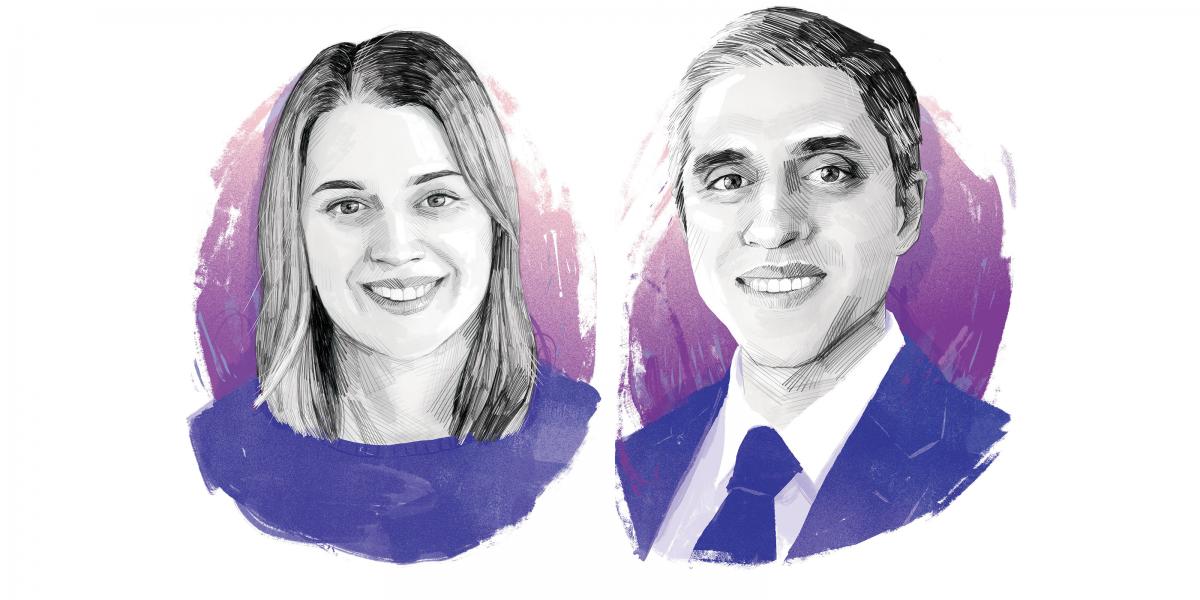Former Surgeon General Vivek Murthy and Colleen Barry on Loneliness and Health
Exploring ways to reduce isolation and improve well-being.
During a nationwide listening tour after being named the 19th U.S. Surgeon General in 2014, Vivek Murthy expected discussions on chronic disease and the high cost of health care. But he was surprised by one problem that surfaced. It wasn’t a frontline complaint, but more of “a dark thread” in the conversations. It was loneliness.
The issue resonated with his own experiences as an internal medicine physician and as a child. Recently named the Distinguished Policy Scholar in Health Policy and Management, Murthy, MD, MBA, is working with faculty and students on critical health issues, including loneliness. Here, Murthy and HPM chair Colleen Barry, PhD, discuss loneliness and its impact on health, which Murthy explores in his book due out in April, Together: The Healing Power of Human Connection in a Sometimes Lonely World (HarperCollins).
CB: Vivek, why did you make addressing loneliness a priority as surgeon general?
VM: I started to realize just how profound and prevalent the issue of loneliness is in our society. At a personal level, I had struggled with loneliness as a child and at points later in life. I also saw it as a doctor. Many of my patients were getting serious diagnoses and having to make difficult life decisions, and they were often all alone.
Let's shift from thinking about loneliness as an individual issue to a societal issue.
CB: Being alone is particularly difficult in a health crisis.
VM: That’s exactly right. But other patients not acutely ill were isolated as a result of mobility issues, hearing issues, having difficulty with their vision. The way they described it to me, they felt like society had just moved on without them.
Even though I didn’t learn about loneliness in medical school, there I was practicing medicine, and loneliness was all around me. Many people were struggling with loneliness and weren’t sure what to do.
CB: Once you got into the science, were you surprised to see the connections between loneliness and health? You’ve noted that loneliness has an equivalent impact of smoking 15 cigarettes a day.
VM: I was really struck. Increasingly in medicine, we have recognized that our mental and emotional state has a profound impact on our physical health and well-being. People who are lonely seem to have significantly shorter lives—though the data that we have on the health impact of loneliness is not nearly as deep as the data that we have on other health threats such as diabetes or hypertension.
CB: Let’s shift from thinking about loneliness as an individual issue to a societal issue. Research indicates that if a problem is thought to be caused by an individual, then we naturally think only about individual solutions.
Take the example of the obesity crisis. If we frame the problem as solely about poor food and exercise choices, then the blame for obesity falls on individuals. By contrast, a public health frame acknowledges contributors to obesity outside of the individual—aggressive food marketing, neighborhoods lacking affordable, healthy food options. This shift in frame suggests a role for society and that public policy can make a difference.
So, what are our public policy tools for confronting social isolation and loneliness?
VM: There’s a lot we can do through public policy to help. And let me be clear, this is not about the government telling you who to be friends with. This is more about creating the environment, settings, and infrastructure for people to interact with each other and to build healthy relationships.
We really need deeper research into the origins of loneliness in modern society, the full depth and extent of its consequences—and solutions to it.
One of the unfortunate consequences of the car culture is that we built cities that were designed for cars and not for people. We have fewer and fewer places where we can come together and interact with each other, both intentionally and unintentionally.
We need to design cities in ways that optimize social connection. This means living spaces close to commercial spaces and walking paths near green spaces so that people are more likely to come out and interact with each other.
CB: What about workplaces and schools?
VM: I think both are extraordinarily important places where people spend a third or more of their time. An environment that promotes connection or disconnection makes a real, big difference in our lives.
It’s not just about creating happy employees. It’s also about creating productive employees, so employers have a clear stake in addressing social isolation. And with schools, there are a number of changes that could make a difference. I think many kids are neglected, and they get left out of things. And not necessarily with bad intentions, but people just don’t think of looking out for the person who might be alone.
Ideally, schools can give kids the foundation for a healthy social life. And that doesn’t happen by default. It happens because you intentionally teach them social and emotional skills.
But ultimately, I think the most powerful solution for loneliness is going to come from a profound culture shift. We need a shift that puts people back at the center of society. I think our society is currently structured to put work, wealth, and reputation at the center.
It’s not that work isn’t important, but it’s a question of where do people fall in the priority list. The shift we need is one that puts people back at the center: When I am making decisions about where I spend my time and my energy, how do I do that in a way that prioritizes people?
